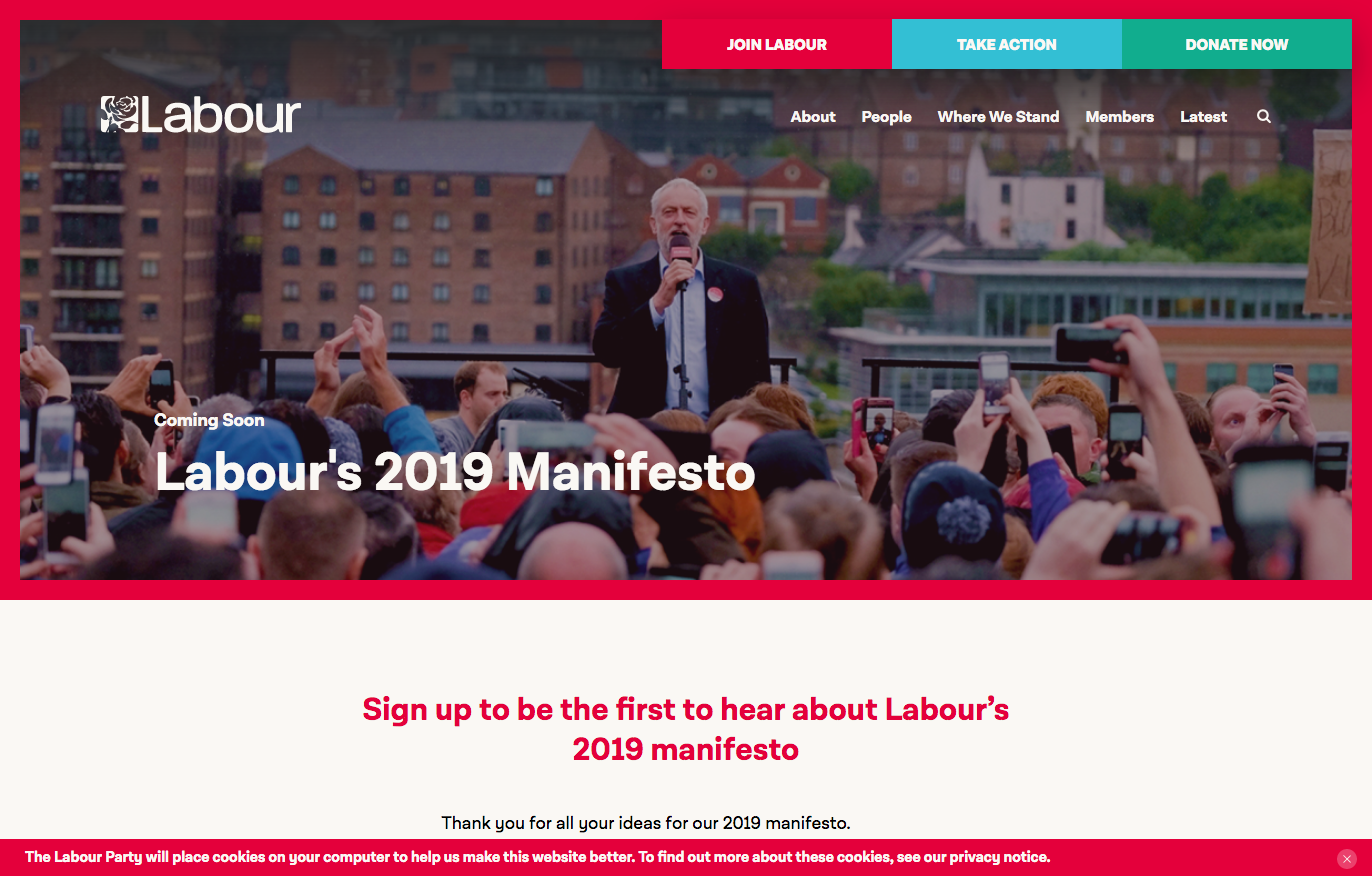The Thirty-Two Hour Dream

In case not all are aware, the UK is currently traversing the land of political turmoil as I type this, with Brexit causing much consternation up-and-down this fair isle. An off-shoot of all this comes in the form of [yet another] general election, scheduled for December 12th. So without wanting to state the obvious, the political parties of this nation are currently working very hard to get their message out.
For the benefit of myself and most others, this post is not about Brexit. At least, it isn’t as I start to type…
The Labour party, who are trying to gain seats from the current governing party the Conservatives, have pledged something that really caught my eye, and it is something that has caused this meandering thought process that you are reading.
Labour are suggesting a 32 hour working-week for the UK.
Now, obviously this is quite a statement, a very bold and brave statement, so naturally I went straight to the Labour website to get the exact wording from their manifesto…

Erm, nope.
Okay, so this particular pledge has been splashed all over the news websites with some quotes and videos as well as a little history going back to the start of this at the Labour party’s conference in September. So please note that in failing to get the exact wording due to the somewhat tardiness of Labour producing a manifesto, the following quotes are from various (but considered reputable) news sources and the press release following the original pledge from the September conference.
Jeremy Corbyn, along with his Shadow Chancellor, has pledged a 32 hour working-week for the UK, to be implemented over the course of 10 years from the moment they take power should they achieve this after December’s election.
The next Labour government will reduce the average full-time working week to 32 hours within the next decade. John McDonnell (Shadow Chancellor)
A shorter working week with no loss of pay. John McDonnell (Shadow Chancellor)
We’ll require working hours to be included in the legally binding sectoral agreements between employers and trade unions. John McDonnell (Shadow Chancellor)
Labour state they will end the “opt-out” from the EU directive restricting workers to a maximum of 48 hours per week unless the individual opts-out. With Brexit still ongoing, I am unsure if, once beyond the transition period, the UK would still follow this or not. Judging by the fact that one of the selling points of Brexit was to avoid having to adhere to the Belgian bureaucrats, I don’t quite follow how this is a sticking point that is worth mentioning. I’m obviously missing something (or perhaps I was lied to*), so I’m including the point.
So, wow, a 4-day, 32-hour working week. That’s one helluva target. And it is one the party say will be worked towards over the course of a decade. It won’t happen on December 13th should Labour win the election. And the party were quite keen to emphasise two more points; it won’t affect all industries, certainly not all at a similar time, and it would be tied to productivity, something the UK has failed to improve on in recent years.
And here is the thing, productivity in the UK has apparently stalled, especially when compared to our European neighbours. With the introduction of automated processes and other computer-wizardry in the workplace, the UKs producutivity was apparently improving quite nicely over time. Until that is, about 2008 when it seemed to level off. And without the ability to produce more in the same time, it is very unlikely the hours we are expected to work will be reduced.
Currently, and according to the NHS, the average working-week for their staff is 37.5.
Bullshit.
The above statement was directed at me from a BBC news article mainly due to the fact that the NHS has become embroiled in this Labour pledge. But the NHS is probably a good organisation to consider when trying to figure out how much we really do work. They must employ all sorts of people in all sorts of roles, on all sorts of contracts and they must face similar issues that many other employers of varying industries do.
The trouble is though, the statement on the NHS website misses a few pieces of key criteria; are they discussing only full-time employees, or is the working-week they state an average across all staff? Furthermore, I believe many of their staff are actually sub-contracted (porters, cleaners etc) and so may not be included, and is this based on what contracts state, or what actually happens in real life in a real-life hospital?
Bullshit.
The NHS are careful to point out that this figure of 37.5 does not include senior managers or doctors, but infuriatingly it also fails to mention if it includes or excludes part-time kitchen staff, porters, cleaners, maintenance staff, office staff and assistants…
I won’t say how many hours a week I work, but it isn’t 37.5. In fact, I would go further and say that while many people in this country probably do actually work that, and many more will have that on their contracts, the majority of full-time employees end up, on average, working more.
And for many, myself included, it is perfectly fine. I’ll work from 8am to 8pm with only a 10-minute pitstop for food when my stomach starts to growl. And when I get home, I’ll end up eating dinner at my desk while I clear the backlog of emails. A twelve or fourteen hour day is fine for me and it is also fine for many others.
The problem I have is that in order to improve the work-life balance for the country you have to start in the right place. And I for one simply do not believe that 37.5 is the right place. Even for office workers, 9-5 M-F, I bet even then some will feel the need to work through lunch, or come in a little earlier, or finish something off at home in the evening.
37.5 ain’t the real figure.
This brings us to the next problem of how Labour actually want to achieve this. And I am struggling to find anything that actually offers anything remotely concrete here. Labour will implement a reduced working week as-and-when productivity improves. But given that productivity has stalled since the last time Labour were in power, I can’t see how this is going to be solved.
So what is the solution…?
…make work worth it. Because a happy and valued worker is a productive worker.
And yes, Labour have pledged a much higher minimum wage for all age groups. But it isn’t all about money. As long as bills are paid and every once in a while people can enjoy the luxury of a takeaway, or a new video game or whatever, people are generally okay with that. What makes work worthwhile is knowing that it is fair, sustainable and rewarding. How much does one think productivity could be improved if people weren’t absent due to sickness? Or because their pet goldfish died? Or because they got hammered the night before? Or because their mate got fired and now earns quite handsomely on welfare?
And increasing minimum wage will just make employers think twice before employing people. They won’t give the young kid a chance, they won’t offer the return-to-work mother a shot because it is too much of a risk. It limits and stifles the workplace because if it goes wrong, the business suffers tremendously.
I suppose it all went wrong during the last recession, which was around-about when minimum wage was introduced. Many industries suffered and the effects of it is still being felt today. When the economy is booming, when businesses are easily making money, that’s when to introduce things like minimum wages and decreasing the working week. Not when the economy is still recovering, not when people are still being careful about what they spend their wages on. And certainly not when the country is in so much political turmoil.
*We were very much lied to. Damnit, it was about Brexit afterall.
After a quick search, it seems manifestos are still to be published for most parties. I always presumed – and especially so given the fact this election was widely predicted for a while – that the campaigning points would have been dished out sooner. Perhaps this is quite normal, I must admit to previously not really wanting this information so soon. And I suppose given the main topic of the election, most of the electorate will know where the parties stand anyway.
Also, and I hate to say this, but of the traditional trio, only Labour have an obvious search function on their homepage.
Ah, okay, the word manifesto isn’t as widely used as perhaps I thought it was.
The Liberal Democrats Plan
The Conservatives Priorities
The Labour Party’s Manifesto will be published once Corbyn has made his mind up, I presume.